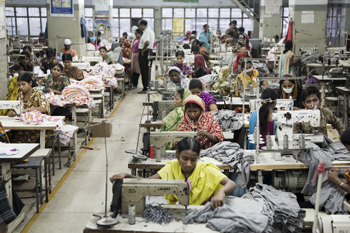For Sunday May 1, 2016
Lectionary Readings (Revised Common Lectionary, Year C)
Acts 16:9–15
Psalm 67
Revelation 21:10, 22–22:5
John 14:23–29 or 5:1–9
A few weeks ago I watched the movie "The True Cost" (2015) on Netflix Streaming. I recommend the movie as worth watching, but, like so much of our news today, it's deeply discouraging.
The documentary explores "the true cost" of our clothing by examining the lives of the 40 million people, 85% of whom are women, who work in third world garment factories for wages as low as $10 a month. The scenery ping pongs from the cat walks of Paris to the sweat shops of Dhaka. The story proceeds along three main lines — human exploitation, environmental degradation, and our culture of consumption.
On April 24, 2013, an eight-story garment factory in Bangladesh's Rana Plaza collapsed, killing 1130 workers and injuring another 2500. This despite many advanced warnings and complaints about the safety of the building. The disaster became emblematic of the many problems inherent in the "fast fashion" business model of how clothes are made for us first world consumers by what amounts to slave labor in the two-thirds world.
A broad range of players get to have their say — although, big surprise, all the major retailers declined to comment — factory workers, managers and owners of the factories, fashion designers, advertising gurus, economists, union activists (who were beaten for their efforts at organizing workers), and even a former manager at Monsanto.
Not all the news is bad. The movie interviews several catalysts for change, like an organic cotton farmer in Texas. There's also Safia Minney — the British social entrepreneur, founder of the fair trade movement, and CEO of People Tree. Livia Firth of Eco-Age works passionately for change. The film's web site even has a drop down menu with five tips for "buying better."
But practically-speaking, when 97% of our clothes are made in sweat shops like the ones featured in this film, it's hard to imagine what the average consumer can do that will make any meaningful difference. At the end of the movie, I didn't feel guilty for shopping at the mall, I felt trapped and discouraged. One reviewer called the movie "despair-inducing."
 |
|
Garment factory, Dhaka. Credit: Clean Clothes Campaign.
|
The psalmist this week prays for God's blessings not just for Israel, but for "all the peoples" and "all the ends of the earth." Like Dhaka, I imagine. That resonates with me as a good prayer, but it also feels like a future so far off as to be negligible.
Similarly, in the reading from Revelation, John says that God is "making all things new." His prophecy imagines a tree of life next to the river of life, both of which are for "the healing of the nations." It's such a beautiful phrase, but it sounds so distant. Like the psalmist, John's vision is global rather than parochial, encompassing "the nations" and all "the kings of the earth." But there's a jarring disconnect between his apocalyptic vision and our contemporary realities.
The kingdom of God is a present reality, said Jesus, but it's also a future hope.
A little over a month ago, March 24 marked the anniversary of the assassination of Oscar Romero (1917–1980), the Archbishop of San Salvador, in El Salvador. Romero was murdered while celebrating Mass in a small chapel in a cancer hospital where he lived.
It's quite a mouthful, but nonetheless worth noting, that in 2010, the United Nations General Assembly proclaimed March 24 as the "International Day for the Right to the Truth Concerning Gross Human Rights Violations and for the Dignity of Victims." That's what Romero did, and that's what the movie "The True Cost" did.
Romero had always been close to his people. He preached a prophetic gospel. He denounced the injustices in his country, like torture, and supported the development of popular and mass organizations. He became the voice of the Salvadoran people when all other channels of expression had been crushed by the repression.
But his life was cut short, with a better future still far off.
 |
|
Safia Minney.
|
One way to process our deep discouragements is to remind ourselves, in the words of a poem-prayer that are associated with Romero, that we work and pray for "a future not our own."
The so-called Romero Prayer was composed by Bishop Ken Untener of Saginaw, and later delivered in a homily by Cardinal John Dearden in November of 1979 for a celebration of departed priests. Romero was murdered five months later.
In a later book of reflections, Utener wrote a piece for the anniversary of Romero’s martyrdom entitled “The Mystery of the Romero Prayer.” He said that the "mystery" is that though the words of the prayer are attributed to Romero, they were neither written nor spoken by him.
A Future Not Our Own
It helps now and then to step back and take a long view.
The Kingdom is not only beyond our efforts,
it is beyond our vision.We accomplish in our lifetime only a fraction
of the magnificent enterprise that is God's work.
Nothing we do is complete, which is another way of
saying that the kingdom always lies beyond us.
No statement says all that could be said.
No prayer fully expresses our faith. No confession
brings perfection, no pastoral visit brings wholeness.
No program accomplishes the Church's mission.
No set of goals and objectives include everything.This is what we are about. We plant the seeds that one
day will grow. We water the seeds already planted
knowing that they hold future promise.
We lay foundations that will need further development.
We provide yeast that produces effects
far beyond our capabilities.We cannot do everything, and there is a sense of
liberation in realizing this.
This enables us to do something, and to do it very well.
It may be incomplete, but it is a beginning,
a step along the way, an opportunity for the Lord's
grace to enter and do the rest.
We may never see the end results, but that is the
difference between the master builder and the worker.We are workers, not master builders, ministers, not
messiahs. We are prophets of a future not our own.
The "Romero Prayer" isn't an excuse to be a passive bystander and do nothing. It's a reminder that in all our work, for Dhaka or Damascus, we must also watch and wait.
We hope and pray for what we don't see, says Paul. We live by faith, not by sight. We persevere, says the book of Hebrews, even though we haven't received the far-off promises of God.
Image credits: (1) Clean Clothes Campaign and (2) Ecouterre.com.





